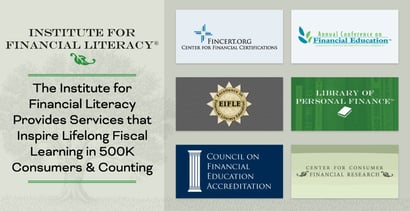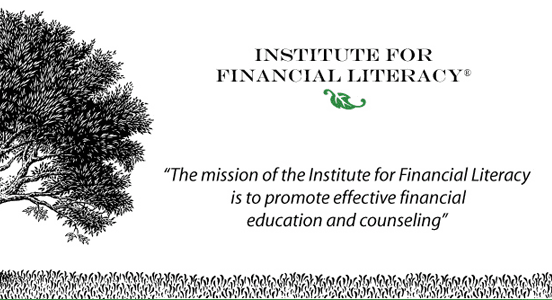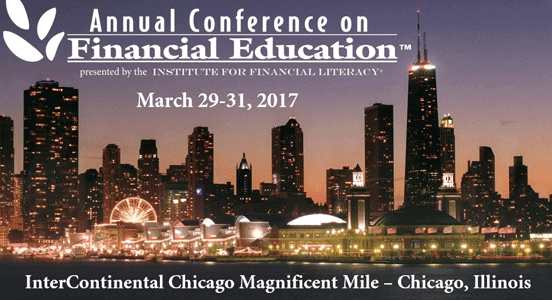

In a Nutshell: In the midst of increasing debt, the rising costs of living and education, and the necessity of retirement funding, financial management skills are crucial and education is key. The Institute for Financial Literacy is a nonprofit that provides the benchmarks and tools for financial educators and consumers to gain and apply these important life skills. Whether you’re seeking to improve your personal finance intelligence or extend it to others, the Institute for Financial Literacy’s free resources, standards for learning and teaching, and avenues for professional certification and accreditation can provide the tools you need to succeed.
The ability to read and write is stressed when you’re in school. What’s not as stressed — but is just as vital to success in adulthood — is financial literacy. Unfortunately, many learn this the hard way. A lack of financial literacy has led to serious problems for both older and younger adults.
For instance, many millennials say debt is already their biggest financial concern, especially student loans. This isn’t surprising since Fastweb and FinAid report that national student loan debt now exceeds 1.1 trillion. As young Americans deal with the fallout of what has become the accepted way to fund higher education, millennial adults need all the financial tools and resources on debt management they can get.
While millennials often find themselves weighed down by debt as young adults, many baby boomers who lacked financial education earlier in life are now approaching retirement without any savings.
In fact, the Retirement Income Deficit Report shows a $7.7 trillion gap between what U.S. households have in their retirement savings and pensions and what they should have saved in order to maintain their standard of living after retirement.
These startling numbers on debt and lack of savings among adults in the U.S. should be a wake-up call to our need for better financial education. Older adults need to learn how to start saving now to make up for lost time.
To avoid the same fate, younger generations need to get out from under student debt and start retirement savings plans early on. All of us need to tackle consumer debt and learn how to manage our financial resources more effectively.

The Institute for Financial Literacy is a nonprofit that aims to help financial educators do more.
If the answer is financial education, where can we get it? With the stakes so high in a world of increasingly complex financial services and situations, even educators can use some help to provide the best financial council.
This is where the Institute for Financial Literacy plays an important role. A nonprofit organization founded in 2002, the Institute strives to empower others to educate. Their goal is that both present and future generations will develop the life skills they need to handle their finances wisely.
Setting the National Standards for Financial Literacy
Regardless of what you learned in school, an abundance of potential financial pitfalls makes it important to ensure you can manage your personal finances.
To provide guidance on how to improve the most important financial skills and measure progress, the Institute for Financial Literacy has created national standards in five key categories: money management, credit, debt management, risk management, and investment/retirement planning. Here’s a breakdown of the benchmarks in each financial category.
- Money Management: This category includes cash flow management, personal net worth, and goal setting. Budgeting is an important first step in handling personal finances, so all adults should be able to create and adjust a budget based on their income and outflow. Understanding income and expenses leads to an understanding of net worth (owned assets minus debts), and, finally, how to set and reach both short-term and long-term financial goals.
- Credit: Most people use credit, but they don’t always use it wisely. This category is pretty straightforward: you need to understand the purpose of credit, where to find the right sources, when and how to use it, and the dangers of abusing it. Credit education can help you make more informed decisions with your lending options and avoid excessive consumer debt.
- Debt Management: This category involves understanding what types of debt are considered good and bad and how much debt load is personally manageable. You should also be able to recognize warning signs of excessive debt and know which resources are available and appropriate to help you regain control.
- Risk Management: Risk management skills include understanding and using insurance options and determining one’s personal “risk tolerance level.” This revolves around how your finances situate you for emergency situations as well as deliberate risky financial behavior, such as certain types of investment. It’s then important to understand how various risk management tools can help prevent unnecessary financial losses.
- Investment and Retirement Planning: With an understanding of personal risk tolerance, you are prepared to learn the risks and benefits of each type of retirement and non-retirement investment opportunity and then are empowered to choose the options that will best ensure your needs are met after retirement.
As a resource for financial educators, the IFL encourages them to use these categories and benchmarks to design a curriculum that’s comprehensive, accurate, backed by research, and accommodating to diverse learning styles. Consumers can also use them to determine and address gaps in personal finance skills.
Resources Include Budgeting Tools and Key Information
To help consumers take the next step and accomplish these financial benchmarks, the IFL provides a full financial education program of its own as well as numerous downloadable, interactive tools. These include budget worksheets and spending logs, loan payoff and savings calculators, a net worth analyzer, and financial goal lists and action plan worksheets.
The IFL also provides helpful links to federal and organization websites, specifics of the Fair Debt Collection Act and credit bureau contact information, and an extensive glossary of financial terms. Together, all of these tools and informational resources form a library of financial self-education.
Programs for Certification, Accreditation & Networking
The Institute for Financial Literacy makes it their goal to educate educators and equip them to spread financial literacy into their own realms of influence. One of the ways they do this is by providing programs and services that set high standards, offering key certifications and accreditation, and hosting networking events.
Fincert.org — The Premiere Certifying Body for Financial Educators
In 2012, the Center for Consumer Financial Research shared results from a study that showed professional certification programs increased financial professionals’ abilities and confidence in teaching key financial categories by as much as 12 percent.

The Institute for Financial Literacy started Fincert to create certification programs for financial educators.
With this in view, the Institute for Financial Literacy’s program Fincert provides certification courses and continuing education for various financial workers, whether finance counselors, residential housing counselors, consumer debt specialists, or consumer receivable counselors. To date, the Institute has issued more than 3,500 certifications in these areas.
Helping Programs Stand Out with Accreditation Through the CFEA
The Institute for Financial Literacy actively supports outstanding financial programs by extending accreditation through the Council on Financial Education Accreditation (CFEA).
Programs that reach these high standards enjoy the benefits of standing out to consumers in a sea of options. Likewise, consumers benefit from knowing they’re entrusting their education (and tuition) to a program that will provide the best value for their investment.
Hosting the Annual Conference on Financial Education
Finally, the Institute for Financial Literacy offers an opportunity for leaders to come together and share resources and inspiration.

The Annual Conference on Financial Education provides a chance for financial leaders to network and learn.
The Annual Conference on Financial Education, an event attended by over 200 professionals in the financial, education, social, and government sectors, personally extends the Institute’s expertise and resources so that every avenue of financial education can succeed.
A Nonprofit that Knows the Value of Financial Education
The Institute for Financial Literacy believes that, just like reading and writing, being able to handle your personal finances is a critical life skill. As such, they’ve made it their mission to extend financial literacy as far and as deeply into society as possible.
Already, the Institute for Financial Literacy’s services, programs, and resources have helped equip more than 500,000 individuals and financial educators with the tools they need to gain control of consumer and student debt, start saving, and invest in their future.
In turn, both young and older adults will be better equipped to pass this vital financial literacy to future generations.
Advertiser Disclosure
BadCredit.org is a free online resource that offers valuable content and comparison services to users. To keep this resource 100% free for users, we receive advertising compensation from the financial products listed on this page. Along with key review factors, this compensation may impact how and where products appear on the page (including, for example, the order in which they appear). BadCredit.org does not include listings for all financial products.
Our Editorial Review Policy
Our site is committed to publishing independent, accurate content guided by strict editorial guidelines. Before articles and reviews are published on our site, they undergo a thorough review process performed by a team of independent editors and subject-matter experts to ensure the content’s accuracy, timeliness, and impartiality. Our editorial team is separate and independent of our site’s advertisers, and the opinions they express on our site are their own. To read more about our team members and their editorial backgrounds, please visit our site’s About page.




